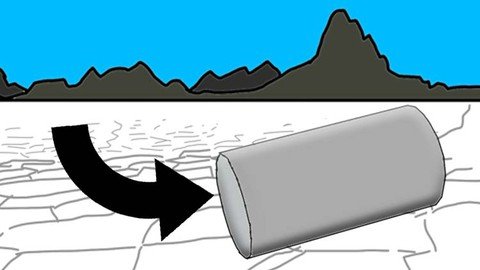
Last updated 2/2022
MP4 | Video: h264, 1280x720 | Audio: AAC, 44.1 KHz
Language: English | Size: 567.61 MB | Duration: 2h 13m
Compact Class on Production, Uses and Recycling of Lithium
What you'll learn
Lithium Production from Brines
Lithium Production from Rocks
Lithium Uses and Supply Chain
Recycling of Lithium in Batteries
Lithium Deposits, Resources and Reserves
Geochemistry and Minerals of Lithium
Lithium Metal and Alloys
Lithium Compounds and Salts
History of Lithium
Organo-Lithium
Chemical and Physical Properties of Lithium
Requirements
General Chemistry Knowledge
Basics in inorganic chemistry
Basis in organic chemistry
a bit knowledge about how a lithium-ion batteries works
Description
Have you ever wondered how the "lithium" finds its way into your lithium-ion batteries? Then this udemy-class is for you!The course gives you a complete overview of lithium and lithium technology.We will talk about the extraction of lithium from rocks and from brines. Here you will not only learn about the different minerals available and the formation of salars, but also all the process details for the production of lithium carbonate and lithium hydroxide.Lithium recycling: You will also get an introduction to the possibilities of recycling lithium from used batteries.In addition, the uses of lithium in different industries, the supply chain and the market share of lithium are covered.A chapter is dedicated to the lithium resources and reserves of lithium deposits around the world.We will also learn more about the geochemistry of lithium and why lithium is mainly found in granitic rocks. And you will learn about the most important lithium minerals. We will learn about the production of metallic lithium from molten LiCl and what typical lithium alloys are and where they are used.A whole chapter is dedicated to organolithium, here we will talk about buthyllithium and its production as well as look at some safety related issues. And we will also take a closer look at different lithium compounds, how to make them and where to use them.The course is purely theoretical, no experiments or demonstrations.Beware: This course is not suitable for beginners in science!!! Good knowledge of general chemistry, knowledge of inorganic chemistry and basic knowledge of organic chemistry are required.There will be no introduction in basic topics such "what is an atom", "how to read chemical formulas" or "what is an acid".
Overview
Section 1: Introduction
Lecture 1 Class trailer - Contents we will cover
Lecture 2 Introduction
Lecture 3 Textbooks
Section 2: History of Lithium
Lecture 4 History of Lithium
Section 3: Chemical and Physical Properties of Lithium
Lecture 5 Lithium in the Periodic Table and Abundance of Lithium
Lecture 6 Chemical Properties of Lithium
Lecture 7 Physical Properties of Lithium
Section 4: Lithium Uses and Supply Chain
Lecture 8 First Overview in Uses, Production and Supply Chain
Lecture 9 Where is Lithium used?
Lecture 10 Supply Chain
Lecture 11 Market Share
Section 5: Geochemistry and Minerals
Lecture 12 Basic Geologic Terminology
Lecture 13 Main Sources of Lithium
Lecture 14 Geochemistry of Lithium
Lecture 15 Abundance of Lithium in different Rocks
Lecture 16 Typical Lithium Minerals
Section 6: Lithium Deposits, Resources, Reserves
Lecture 17 Lithium Resources and Reserves
Lecture 18 Close-up: Brine Deposits
Lecture 19 Close-up: Rock Deposits
Section 7: Introduction Lithium Production: Overview of Flowsheets and Production Processes
Lecture 20 Lithium Production: Overview Flowsheets
Lecture 21 Production Processes: Introduction
Lecture 22 Production Processes: Crushing and Screening
Lecture 23 Production Processes: Hydrocyclone
Lecture 24 Production Processes: Froth Flotation
Lecture 25 Production Processes: Filtration
Lecture 26 Production Processes: Ion Exchange
Lecture 27 Production Processes: Precipitation
Lecture 28 Production Processes: Solvent Extraction
Lecture 29 Production Processes: Magnetic Separation
Section 8: Lithium Production from Rocks
Lecture 30 Introduction Mining Flowsheet
Lecture 31 Crushing and Screening
Lecture 32 Froth Floatation
Lecture 33 Washing, filtration and Drying
Lecture 34 Mineral Conversion Overview
Lecture 35 Acid-Roasting: Flowsheet
Lecture 36 Acid Roasting: Conversion Alpha to Beta-Spodumene
Lecture 37 Acid-Roasting: Sulfuric Acid Digestion
Lecture 38 Acid-Roasting: Leaching
Lecture 39 Acid-Roasting: Refining
Lecture 40 Acid-Roasting: Precipitation Li2CO3
Lecture 41 Lime Roasting: Flowsheet
Lecture 42 Lime Roasting: Calcination
Lecture 43 Lime Roasting: Leaching
Lecture 44 Lime Roasting: Refining and Crystallization
Lecture 45 Alternative Approach - Ion-Exchange Flowsheet
Section 9: Lithium Production from Brines
Lecture 46 Overview Flowsheet
Lecture 47 Solar Pond Evaporation
Lecture 48 Precipitation from Brine
Lecture 49 Conversion to LiOH
Section 10: Lithium Metals and Alloys
Lecture 50 Lithium Metal Production in General
Lecture 51 Electrolysis of LiCl
Lecture 52 Uses of Lithium Metals
Lecture 53 Lithium Alloys an Overview + example in aircrafts
Lecture 54 Lithium Alloys in Batterie Anode
Section 11: Lithium Salts and Compounds
Lecture 55 Short Video on a couple of Examples
Section 12: Organollithium
Lecture 56 What is Organollithium?
Lecture 57 Where is it used?
Lecture 58 Preparation
Lecture 59 Structure
Lecture 60 Problem with THF
Lecture 61 Safety Aspects
Section 13: Recycling Lithium
Lecture 62 Introduction
Lecture 63 Recycling: General Flowsheet
Lecture 64 Recupyl
Lecture 65 Acurec
Lecture 66 Toxco and AEA
Lecture 67 More about Recycling...
Chemistry Students,Material Scientist Students,Chemical Engineer,People interested in Lithium,People interested in Batteries
Homepage
https://www.udemy.com/course/lithium-technology/Links are Interchangeable - No Password - Single Extraction



